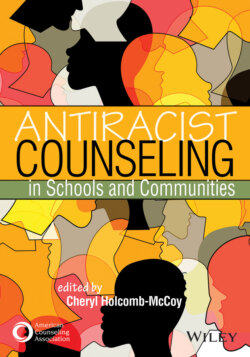Читать книгу Antiracist Counseling in Schools and Communities - Группа авторов - Страница 39
A Political Critical Standpoint Lens to the Counseling Canon: In Practice and Research
ОглавлениеHere we detail how developing this critical standpoint represents a critical first step toward the ambitious goal of achieving a decolonized and antiracist approach to counselor pedagogy and praxis (Prilleltensky, 1994). We believe that teaching is a political act (Freire, 1972). Teaching counseling students how to see, name, and challenge racial injustice and sharing knowledge and ideas is inherently political.
Over the arcs of our respective careers, we the authors have all lamented the following: How effective are my interventions in cultivating students’ critical consciousness (i.e., the ability to recognize and analyze systems of anti-Blackness and the commitment to take action against these systems) if those interventions still conform to the dictates inherent to the traditional European counseling canon (Henfield et al., 2017)? For example, to teach theories is to engage in an exercise of promoting and endorsing theories that are supposedly universal when they are in fact a set of language, stories, and theories reflecting the traditions of economically secure, traditionally educated, socially privileged white men and white women. Symbolically, this advances the idea that within the profession there is a body of scholarship that warrants our attention and respect that is juxtaposed against emergent theories from marginalized thinkers that can be engaged only obliquely. The exclusion of Black scholars (and other nondominant perspectives and forms of texts) within the counseling canon communicates to counseling students, in subtle and profound ways, that a decolonial or antiracist perspective is not central to the counseling profession or one’s professional identity (Goodman et al., 2015). The literary counseling canon permeates our profession on many levels and undoubtedly shapes counseling’s professional values. Disrupting the counseling canon and moving toward antiracist teaching requires a willingness to examine the underlying cultural (i.e., white) values and social, political, and moral assumptions that serve as the foundation for counseling (Wrenn, 1962).
